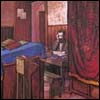Question:
I've always enjoyed studying the Torah. I deeply appreciate its value system and its moral code. After all, it's authored by G‑d Himself and our creator probably knows what's best for His creations.
But I don't understand the detailed analysis of the Torah on your site. Why dissect every seemingly redundant letter or word in the Bible? Isn't that taking it a bit too far?
Response:
Imagine for a moment Albert Einstein walking down the street and dropping a pen. As he bends down to pick it up, the unfortunate occurs. His pants split. He makes a U-turn, heads back home, and mends the pants.
Here we have Professor Einstein with a needle and thread.
Does this act express his prodigious wisdom? Certainly not. Even as he sews, Einstein ponders deeper thoughts. But part of life, even for a genius, is making sure there isn't a split in his pants.
The point I'm driving at is that we often tend to equate G‑d's authoring of a Torah to Einstein sewing his pants. Something He does because, well, it's something that was necessary to do. But that's not how the sages of Israel viewed the Torah.
Popular conception has it that after G‑d created a world, He saw the need to give us earthlings a moral code to follow. Thus, the Torah was born. It's here to keep the world civilized and sprinkle some meaning into man's often chaotic life. Something like a self-help manual for humankind.
If that were the sum total of Torah, it would have very little to do with G‑d Himself. It might be part of the Creator-of-the-World job description, but—like Einstein sewing his pants—it has little do with G‑d's essential wisdom. Don't steal, don't hurt anyone, give charity—very nice, but this you call infinite wisdom?
And so, we are told that, "The Torah preceded the world by 2000 years."1
In other words, the Torah is not just G‑d's guidebook for man. It precedes man, precedes world, precedes all of existence. It's G‑d's own wisdom, that He, so to speak, discusses with Himself. And He decided to share that with us.
Since G‑d is a complete oneness, His wisdom is also one with Him—and so, as the Zohar tells us, "G‑d and His Torah are completely One."2 So basically, when He gives us His Torah, He gives us Himself.
Now, when this G‑dly wisdom (after descending through myriads of spiritual dimensions) enters our reality, it translates into some pretty useful laws. But that's only because something purely G‑dly will express itself as the ultimate truth on every step of the ladder. Now that's pretty neat: G‑d Himself wrapped up in a nifty package of applicable wisdom.
That's one reason the Torah begins with a Bet, and not an Aleph. Whether studying its laws and finding them ethical - or its stories and finding them inspirational - we are to always remember that we aren't starting from the beginning of the story. The beginning of the story is way beyond us, with G‑d Himself. What we get to see is only the final stop, as it applies down here. But if we will dig a little deeper, turning over and over each word and every phrase, asking, "Why did He say it that way? What's behind all of this?" then perhaps we can get a glimpse of what's really inside that wisdom.
There's much more to write on the topic. I'm sure you'll enjoy another essay: G‑d in the Talmud







Join the Discussion